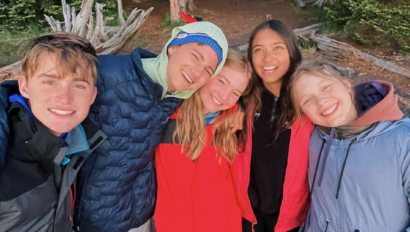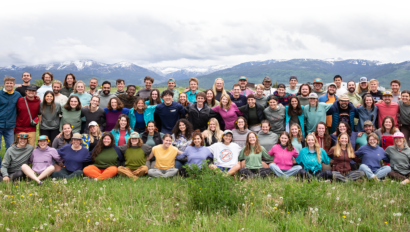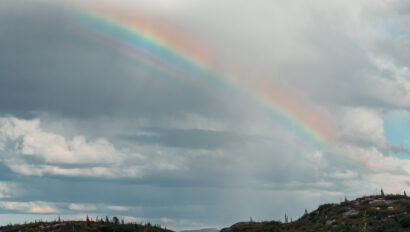
Wilderness Adventures staff are required to have a minimum Wilderness First Aid certification. Many, however, hold higher certifications such as Wilderness First Responder or Wilderness EMT. Though every one of our staff members are picked for their excellent judgment and whole-heartedly prepared for anything post-staff training, Wilderness Adventures has had a long-standing relationship with Dr. Brent Blue in order to best serve our families and their children. Dr. Blue is our consulting physician, whom we go to throughout the summer. He also makes an appearance at every staff training to talk to our leaders about some of the most common things they will see on their trips, as well as answer any questions they might have.
Recently, we sat down with Dr. Blue to ask him a few questions about himself, Wilderness Adventures, and to get his knowledgeable advice on a few things.
Wilderness Adventures (WA): Why did you want to become a doctor?
Dr. Brent Blue (DB): Doctor Kildare on TV, I knew from when I was 11 years old.
WA: How did you get involved with working with Wilderness Adventures?
DB: I know Mike and Helen well. I have been their friend and physician for many years. I have also had a lot of experience in the backcountry and am heavily involved in the climbing and backcountry community.
WA: Why did you pick Jackson as your base? And how long have you lived here?
DB: I am originally from Louisville, Kentucky. I moved here in 1982, because I used to climb and ski a lot, and I was looking for a place in the mountains. I still do a lot of skiing but replaced climbing with mountain biking.
WA: Why serve as WA’s on call DR?
DB: Mike and Helen approached me about it awhile ago, and I entirely agree that it’s a good idea to have medical backup for any kind of camp or backcountry activity. Even simply to have someone to check in with about a child’s medications. It’s especially helpful to provide reassurance to leaders that there is always a knowledgeable doctor around to help them with whatever they need. I believe it’s just a good policy to always have someone to call.
WA: What are the most common wounds, ailments, or situations you have seen with WA students over the years? Any advice you could give to future students?
DB: The absolute most common thing is blisters. Kids often come with new hiking boots that are not properly broken in. They are not used to walking long distances on rough terrain, and naturally, get blisters.
The worst thing is when the kids get hot spots and they don’t want to stop and slow everyone down or tell their leaders. The kids don’t realize that by ignoring the problem early on, they are going to have a real painful problem on their hands later on. Taking those few minutes to let your leader know that you feel some warm rubbing on your heels is well worth it. Ignoring those hot spots increase the risk of developing blisters that can lead to open wounds, pain, and all sorts of much more serious situations.
Other than that, most of what WA kids deal with are your general scratches, bruises and dehydration. Kids tend to not want to drink as much as water as they should—nor are they used to being so active all day long. They need to increase that water intake to match their activity. Most headaches and fatigue kids feel on trips is due to not drinking enough water. Headache, stomach ache, fatigue–it can all be cured by just drinking enough water!
WA: Do you have any general health safety and tips for folks traveling over seas?
DB: First, make sure they have all their proper immunizations. I also recommend antibacterial soap, like Dial or Lever 2000. Being able to wash with antibacterial soap really reduces infections if they do get scrapes or cuts, which everyone does.
WA: How do you keep a sick kid hydrated in the back country?
DB: Keep them hydrated when they are not sick! People often measure suggested water intake by how many liters or bottles or glasses you should be drinking. This is not the way to do it. The surefire way to understand how much water anyone should be drinking is that you need to drink enough fluid to where you have the need to urinate every three hours. If a kid wakes up, goes to the bathroom, and then doesn’t have to urinate again until lunch time at one o’clock, then that kid is not drinking enough water. Urine output is a much more sensitive measure than intake. There are many factors, like temperature and activity, that affect how much water one needs. If you are outside rock climbing in the sun all day, you will need a lot more water than if you are in the library studying.
Frequent water breaks are very important. Kids should also keep their water bottles handy, so they can drink water easily and often without feeling like they are holding back the group.
The other thing that is especially helpful is not eating lots of salt but instead eating spicy foods. This will help kids drink more. Hot sauce is a great thing to have on any trip, as it will increase thirst.
WA: Can you submerge cuts/scrapes into salt water to help clean them?
DB: The best thing is always soap and water. Salt water can be contaminated. Your best bet is always antibacterial soap. If you don’t have antibacterial, then go with normal soap.
WA: What are some creative ways to get kids outside at home and living a more active life style?
DB: A regimen of suggested workouts would be great for kids that are about to attend a WA trip. Walking an increasing distance over hilly terrain, for example. Nothing is going to prepare them as well as getting out and doing something, at least as far as distance and time. And they should definitely be getting out there in the boots that they are going to be wearing on their WV trip!
When I was young, most of my activities outdoors were team sports. Now, I do everything outdoors and nothing with a team! There is so much to do and see out-of-doors, kids need to have the time to get out and see it. Plus, being outside and dealing with elements a person cannot control builds confidence and self esteem.
So many kids have been raised with rather extreme schedules and are so busy, they don’t have the time to get outside. Free time needs to be built into their schedules.
Also, we are very protective of our children and wary of them being by themselves or exploring, when that can be very beneficial for children. I really encourage kids to explore their areas. Even in the biggest cities like New York or Chicago, there are still nearby areas to hike and enjoy the outdoors. This is especially important for kids planning on attending a WA trip in the summer, as there is no better way to get in shape for hiking than hiking! It also gets kids exposed to what’s going on in the outdoor world around them.

